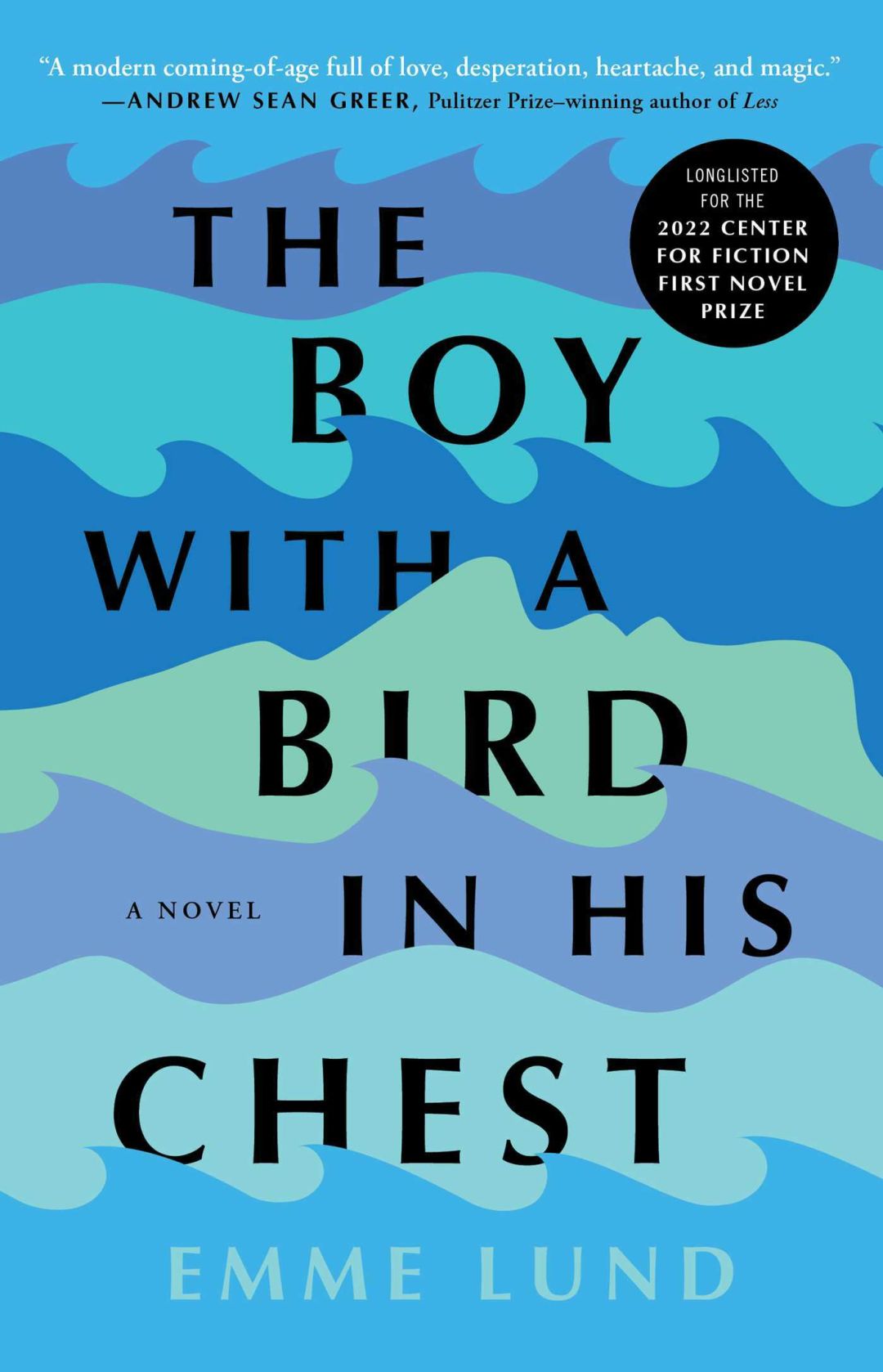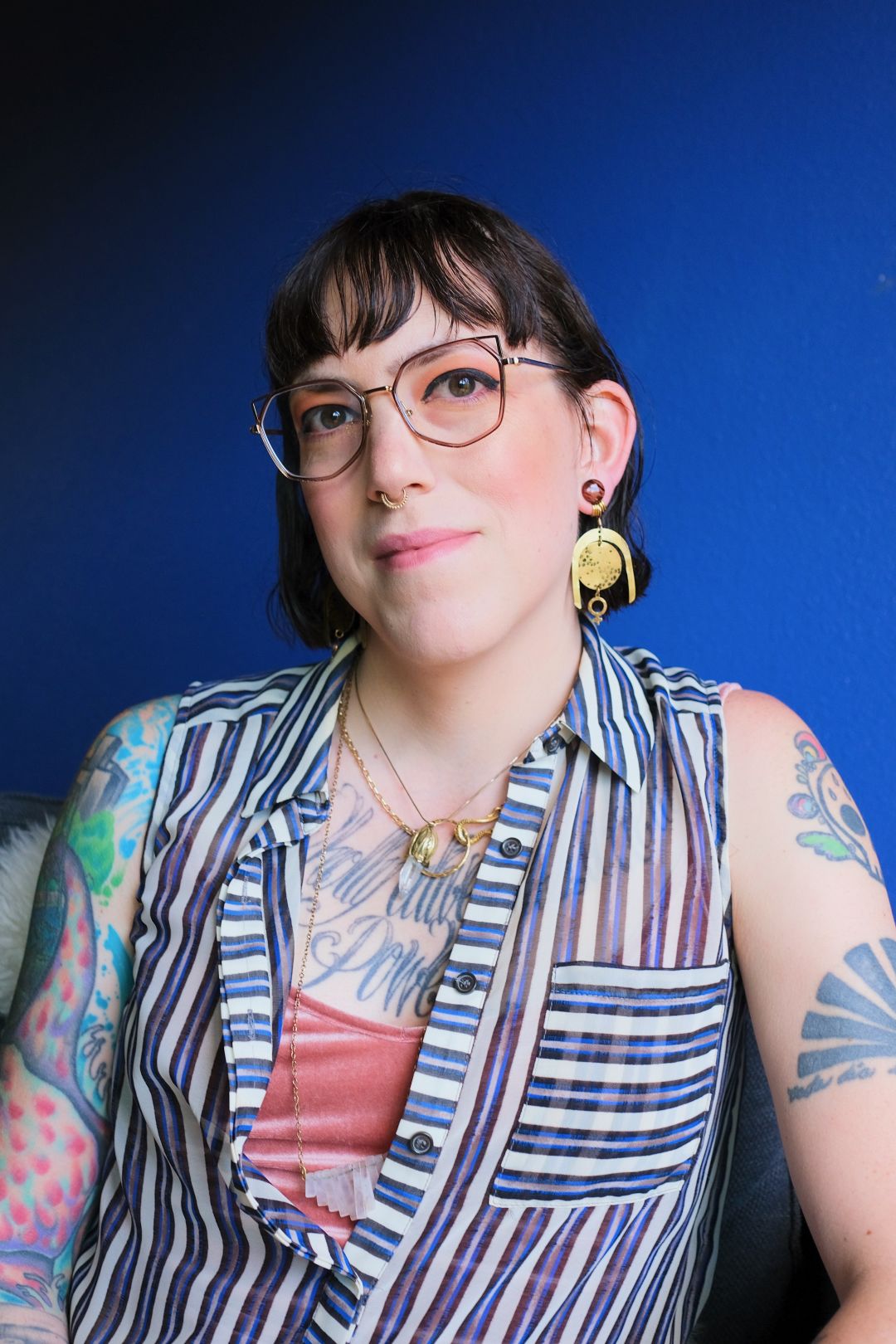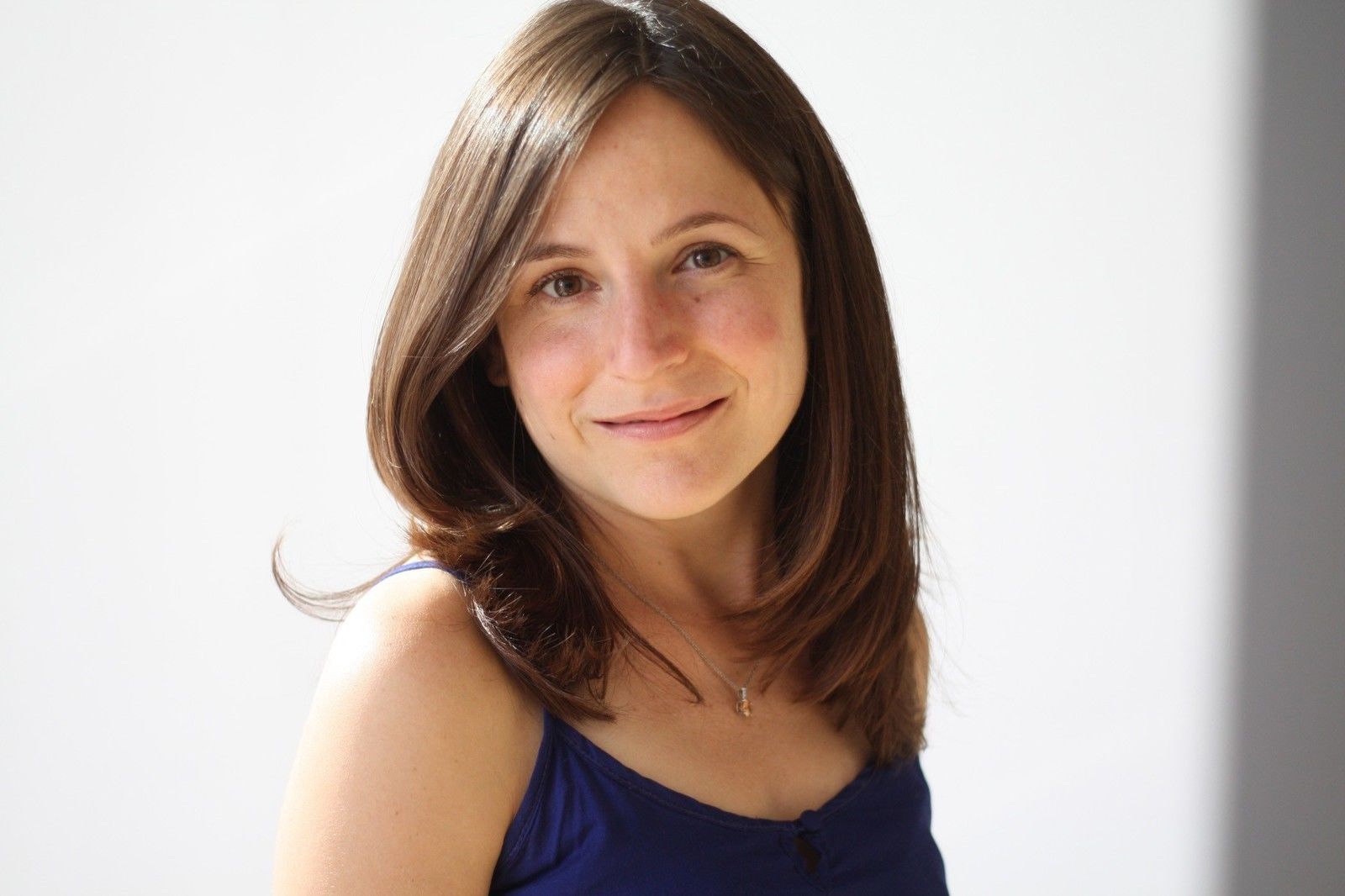Catching Up with Oregon Book Award Finalist Emme Lund

Image: Courtesy Simon & Schuster
It’s not uncommon to turn our conscience into a character. In Double Indemnity, claims investigator Barton Keyes incessantly refers to the “little man in his chest” who guides his intuition. Christian folklore often assigns its characters a dedicated guardian angel, steering them out of harm’s way. In Portland author Emme Lund’s debut novel, The Boy with a Bird in his Chest, the reality is slightly different.
Gail, a java sparrow bursting with canned one-liners and wisdom far beyond her years, literally lives inside the protagonist, Owen’s, chest. His ribs serve as an open-air, quasi-birdcage, and the two navigate Owen’s adolescence as a queer boy in rural Montana and Washington state in tandem. Owen’s queerness presents obstacles, but his physical differences put him in a constant state of hypervigilance, fleeing a swarm of doctors and authorities who want to research his condition dubbed “the army of acronyms.”
After its initial release in February 2022, the book was written up in USA Today, People, the Washington Post, and Buzzfeed, among others. This morning, it was announced as a finalist for the Oregon Book Award.
In addition to her fiction, Lund has written about her lived experience as a trans woman in essays for the Rumpus, the Mercury, Autostraddle, and Time magazine advocating for trans and queer rights in legislation.
Through all of her work, Lund says her goal is to elucidate the experience of being marginalized, asking, “What does it feel like to be a person that the institution wasn’t built for?”
In the first days of this year, Lund gave a reading at Broadway Books—a leg of her micro-book tour celebrating the paperback release of the novel. She stood at the back of the store, surrounded by a few rows of folding chairs, tall, over six feet.
Due to the holidays, and the nature of book events, the reading was intimate. A handful of people sat close, leaned in, and listened to Lund read aloud about Owen and Gail. When it was Gail’s turn to speak, Lund leaned back, her eyes widened and her shoulders stood proud, making points at the top of her black sweater—birdlike. She put on a voice; it came with a smile and, more than anything, felt joyous. At once, her “bird voice” signaled, “Yeah, a bird talking is a little funny,” but also, “This bird might be magical, but she’s also very much real.”
A few weeks after the reading, we caught up with Lund over coffee to hear about the response to her debut novel, the themes of queer joy across both her fiction and nonfiction writing, and what she’s been working on lately.
Our conversation has been condensed and edited for clarity.

Image: Courtesy Simon & Schuster
Portland Monthly: So, you and I have met before—very briefly.
Emme Lund: OK.
At the Portland Book Festival author party, Andrew Sean Greer asked me, “Have you met my friend Emme Lund?” I mention this because, with him doing the quotes on your book and whatnot, it feels like him saying, “Have you met my friend Emme Lund, literary world?” I’m curious, how do you know him, and what is that relationship like?
We’ve been good friends for the past 15 years, probably. I met him through my wife’s family. We all got together at this beach house. I was probably 22 years old and just starting out as a writer, and [The Confessions of] Max Tivoli had just come out. He was basking in the glory of selling a New York Times best seller and all of that.
We just talked writing the whole time. He’s very generous, and very sweet. And we built a friendship. And, you know, I lived in Oakland for five years. And so throughout that time, we hung out quite a bit. [Greer splits time between San Francisco and Italy.] He’s always been very supportive of me and my work. Even before he was a Pulitzer Prize winner.
I look up to him a lot. He really made the possibility of being a very successful, out, queer author visible to me. Before then, I personally didn’t know anyone who had that level of success who was queer and out. He made me feel like I could do it—like I could write a book and get it published and find some success as a writer.
He always does a thing when we go to parties together, where he just literally steers me around and introduces me to everyone. At that party, he was like, “Come talk to Reza Aslan,” and Tom Perrotta, and all these people. I’m very fortunate for that. I wish all of our success was based on merit and our writing alone. But it’s also meeting people and being in community.
How do you feel about the book being labeled magical realism? About genre writing in general?
When I set out to write the novel, I wasn’t like, “Oh, I’m writing a magical realism, coming-of-age tale that’s going to fit into these parameters and walk this line,” have this YA and adult literary genre definition. But those genres are helpful. They exist for a reason. They help readers navigate bookstores and libraries and find books. They help publishers build lists. They help editors say what they’re looking for. But it’s not something that’s on my mind while I’m writing.
I’m not like, “Oh, this isn’t magical enough,” or “This isn’t meeting these conventions in order to fit this genre.” I’m drawn to books that are weird and magical. That’s what I love reading.
It’s not all I read, but I love [Jorge Luis] Borges, and [Nikolai] Gogol and [Gabriel García] Márquez, and modern [authors] like Karen Russell, and Kelly Link and people like that are really inspiring to me. Magical realism, or slipstream, or speculative fiction, or whatever you want to call it … all of it feels very real to me, and that’s why I write into that.
Why did you start the book by describing exactly how a bird lives inside a boy’s chest?
I think it’s best if the reader understands sort of the rules in the beginning. I didn’t want a reader to come 20 pages into the book, and then all of a sudden there’s a bird.
So, if on the first page I can say, “These are the rules, this is how you are going to read it,” you’re going to read it as though it’s fact, right? And I’m going to describe it as though it’s there in front of you. I’m gonna explain all the little mechanics: how the bones sink back into the skin, how it feels natural, how it’s not like, bleeding, or anything. And then we can move on, on to the story.
Did you write this book for a specific audience?
I think the more specific you can get with the reader you’re addressing the better. And with this book, I really was writing to 18-year-olds, and to myself: I wanted to write a novel that I wished I had come across when I was that age.
In an essay for the Rumpus, you described your queerness as a rock in your throat. And Gail has a rock in her throat—
[laughs] She sure does.
It seems like she’s the character you identify with most in the book, at least from a personality standpoint?
Yeah. She was the one who was very clear.... From the moment I started writing, her character felt fully formed. She talks nonstop. She’s very funny. I think she’s also really sensitive. I say that, and then I think about all the ways I’m sort of poking fun at myself by making that comparison. She thinks she understands humans and makes these observations—these sweeping observations all the time—and she’s wrong half the time. Which we all are. But I can’t really relate to being trapped inside a boy’s chest....
Nobody can relate to being a bird living inside of someone, literally, but you talk explicitly in the book about the idea of taking up space—which stretches to mean a few different things. In particular, the relationship between Owen and Gail: who’s taking up space in whose body. And then in the outside world, in regards to people who don’t seem to worry about anything and take up all the space they want.
Yeah.
What does that mean to you? What is the bigger idea of taking up space?
I’m loud. And I talk a lot. I get boisterous, and I get excited about things. But I also think that, for a lot of my life, I didn’t understand that I was allowed to be that way. I just was. But it felt wrong. It felt wrong to take up space like that. I saw other people around me as deserving to take up that space. And I thought—even though I couldn’t help it, and I was still chatty and loud and all those things—that I should be quiet; I thought that I shouldn’t take up that space..
This book took me seven years to write. You start to notice recurring themes and motifs … and one that kept coming up in this book was just this notion of space. This question of, “Well, who is allowed this space? How can we make it so that everyone is allowed this space? And people aren’t drowned out because [others] are taking up so much space?”
Another theme of both your nonfiction work and of this book, is the idea that things usually wind up differently than you think they’re going to. In writing about your personal experiences coming out, and Owen’s anxiety about coming out both as queer and as a boy with a bird living inside of him, the anxieties are usually different from the realities.
That’s really what the book is about. At its core, the question it’s trying to answer is: How do those of us who feel different from others around us … maybe we feel like there’re others who exist like we do, but we can’t ask, because sharing that would make us vulnerable to the dangers that are out there—
—so what do you do?
That was really at the heart of it—the question I kind of became obsessed with answering. And I don’t think I came up with an answer, other than to sort of find a mix between the two. You cannot hide away in your house. It becomes very clear that, especially as a 14-year-old boy, that that’s not life either.
For those of us who are queer, trans, marginalized—life is about navigating that.
Right now in the United States, we’re seeing record amounts of state legislation against trans health care; against queer folks in general. I know that the response to that threat can’t be to hide away, can’t be to pretend like we don't exist, can’t be to go back underground.
We’ll never be underground again. That’s just the way it is.
Did being in the mind of teenagers present the opportunity to more explicitly name things—like politics—because that’s how teenagers talk?
When you’re coming of that age … I wanted to capture that feeling of like, the vinegar you feel when you’re pissed about something. You’re becoming a person, and you’re starting to understand yourself really fully. And you’re realizing that the world is fucked up in all of these ways. And so it kind of puts some ire in you.
In an essay for the Mercury about seeking, or not seeking, vocal therapy as a trans woman, you wrote: “I thought I’d exit the pandemic a new woman.” I think the sentiment of that essay is like, “Things rarely turn out how you think they’re going to.” Can you talk about your life before the pandemic and now?
If you look at my career, you’re like, “Oh, clearly, she hit it big in 2020 … found success in 2019, 2020.”
Behind the scenes, I had already written the book. I had already come out to friends and family and my community. I had been out for over a year. I had already started hormones. It just sort of bubbles up and it reaches the surface at a certain point.
I don’t know if other trans folks experience this—I would guess they do. But you have this notion that there’s a concrete end date to a transition, right? Like, you start hormones, and then two years in, everything that’s going to change is changed … you have a few surgeries, if you want ’em, whatever. And then you reach a point to where it’s done, and it’s settled. And I think that’s true. I think that’s absolutely true. I think it takes longer than that, though. And I also think that when you’re living it, it’s this like, slow burn.
I think in many ways, I did leave the pandemic a new woman. Just not in the ways I thought I was going to.
In the novel, we immediately learn that Owen doesn’t plan to live past 17. In an essay you wrote for the Rumpus, you talk about your evangelical Christian upbringing and religious ideas about the world ending. That sentiment of living with some version of a light at the end of the tunnel is often present in your work.
Until five years ago, I never saw myself living past 35. I could not envision it. I couldn’t imagine it, in a way. I didn’t plan for it in a lot of ways.
It was very important to me that I somehow captured that without making it central to the plot, even though that’s how the book starts, and it’s a theme. I wanted it to be this sort of low-level buzz, like, “This is always an option.” One of the things I wanted to write in this book, too, is that feeling of: What does it feel like to push past that?
It seems to be a theme that the outcomes are not only different than you initially expect, but usually better.
Growing up when I did and where I did, all the only stories I got to read were queer tragedies. We were living through the AIDS crisis in the ’90s. All the stories were about sickness, were about violence done against us. With my family being involved in all of the tiny evangelical churches, it was all day Sunday; it was Bible study Wednesday; it was youth group Thursday … every day of the workweek was another church event and the church events were always preaching a lot about homosexuality and it being sin and pushing against queer people and trying to push us underground again.
Seeing those narratives of queer tragedy over and over again, and not seeing any other option, you just take it for fact. That was really one of the reasons I wanted to write into this feeling of queer joy, and it’s why I centered it in my book.
There is some tragedy, there is some violence, but at the center of it, when you’re living your authentic self, when you’re being a full human in community with others, when you’re fucking who you want to fuck—all of those things lead to joy, lead to this expansive feeling of abundance and community and love.
What has the past year of having your book out in the world been like?
It seems to be the theme of this conversation: you think something’s gonna go one way, and you expect certain things, and then you’re totally floored by other things that you didn't see coming. We have these ideas: reviewers will hopefully like it, you know, people will hopefully like it, and it’s sort of abstract.
I get messages weekly from people—high school aged, from parents, from grandparents—who were just grateful for the book. And I think it’s been the most rewarding part of the process.
Nothing fills my heart like hearing from a 15-year-old that my book helped them come out to their parents. Or hearing from a grandparent who said that they felt like they were able to connect with their trans grandchild because of the book.
At a recent reading, you described your next book as “Thelma and Louise with fairies and goddesses.”
Yeah.
Tell me about that?
It’s about these four people who end up getting caught up in this sort of road trip fugitive situation. And then there are a few fake texts kind of woven through about the folklore of these goddesses and fairies and monsters and witches.
It’s near distant future; it’s set in Oregon. At the very beginning, this trans woman and her friend rob a pharmacy, and steal hormones and distribute them to their community. There’s a limited supply, and the limited supply is reserved for those who have health insurance. And the only way you can have health insurance is—or good enough health insurance to access hormones—is if you’re in a labor union, and the only labor union that exists is the police labor union. So, it’s a moment where a lot of trans and queer people join the police force and become cops, or they marry a cop.
And then also, “Are goddesses and fairies real?”
Is there a timeline for when it will be out?
Not really. I’m finishing a draft currently—this week maybe. And then from there my agent will have notes; we’ll go back and forth. And then we hopefully sell it. It’ll be another year from when we sell it before it sees shelves. It’ll be some time.




